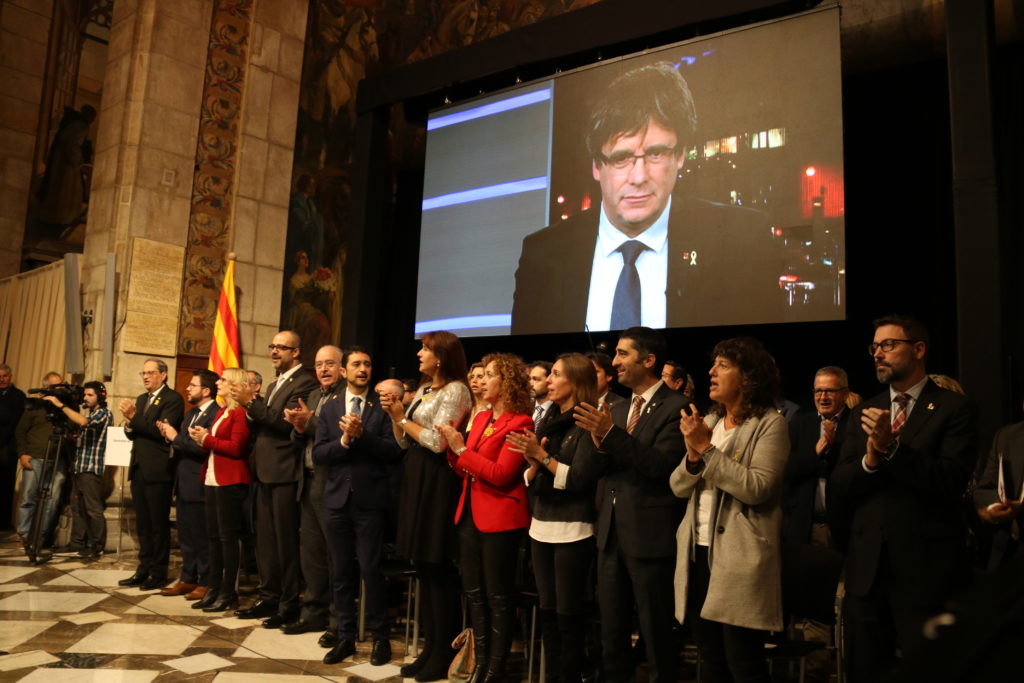31.10.2018 - 11:25
|
Actualització: 31.10.2018 - 12:25
Catalonia’s Council forthe Republic was rolled out yesterday in Barcelona. The event was attended by Catalan president Quim Torra and former president Carles Puigdemont, the latter via a live videofeed from Brussels. The Council was unveiled exactly one year after the exiled Catalan government in Brussels was first presented at a jam-packed press conference.
Between today and December 8, the date when the Council has called an assembly of pro-independence forces in Brussels, we will increasingly learn about the key aspects of how this new institution will operate.
However, we can already anticipate —from public statements and signed agreements— what the project’s five main goals are: building an institution for the Republic, promoting radical democracy, putting technology at the service of politics, mobilisation and internationalisation. All that —and this is the main issue on the agenda— whilst working closely with the government in Barcelona and appealing directly to the Catalan people.
These five great challenges have been readied over the last few months, under Toni Comín and Puigdemont’s political supervision, but with a great deal of technical preparation that should allow the Council to work properly and, above all, to establish direct contact with the Catalan people.
A foundation set up in Belgium
The first challenge is obvious: to build the institutions that emanate from the republican mandate arising from the October 1 referendum. Catalonia’s pro-independence parties explicitly accepted Madrid’s direct rule when they agreed to run in the December 21 elections called by then-PM Mariano Rajoy. However, the Council for the Republic will allow them to invoke the legitimacy that was shattered by direct rule when this was imposed through Article 155 of the Spanish Constitution.
For that reason the Council’s inception will take place outside of Spanish law and its starting point is last year’s self-determination referendum. After having tried out a number of different ways, the Council is finally born as a private institution, a foundation set up in Belgium. Still, decisions such as unveiling it in Barcelona’s Palau de la Generalitat highlight the fact that its legal form is primarily a practical decision to avoid becoming entangled in the cobweb of Spain’s justice system.
On this point, one of the questions that will presumably be answered in the coming days is what sort of formal relationship there will be between the Council and the government in Barcelona, which they obviously want to be a high-profile one.
Estonian model
The Council’s second challenge has much to do with the third. The aim is to build a new radical democracy with the aid of an extensive use of new technology. Inspired by Estonia’s success story, the Council will promote institutional governance based on the people constantly taking decisions for themselves and overseeing the institution itself.
This will involve mobile apps and web pages that will allow consultations, votes, monitoring the work of the representatives and submitting proposals. The plan is to try out a model of political organisation that is meant to pioneer the Republic’s. There has been much talk on specialised media about using blockchain technology, which provides security and confidentiality to a level untested elsewhere.
The Council’s fourth goal is to rally the Catalan people, especially on anti-repression matters, and closely linked to any action that the Barcelona government, the political parties and the grassroots groups might promote. The role of the exiles when it comes to exposing the trial in Spain will be of paramount importance and the Council wishes to embrace and strengthen it. The job of exposing the Catalan issue before European and world institutions, such as the UN, might be retained by the Council, with a view to persevering with the work done so far.
Direct interaction
Finally, promoting the Catalan cause abroad, mainly centred around the work which president Puigdemont is already doing, will be another of the Council’s top challenges. The Catalan president has become a regular guest on international media and he is forever taking part in events and conferences in numerous European countries. Now the Council for the Republic will afford coverage to his activities and will boost them further.
Nevertheless, it will all depend on how this new institution is received by the Catalan people. President Quim Torra has made an appeal “to welcome” the birth of the Council of the Republic, but it won’t be until the IT tools are activated and the public can interact directly with the Council that we will grasp the actual impact of the institution and the new possibilities it affords the pro-independence movement which it aims to represent.


